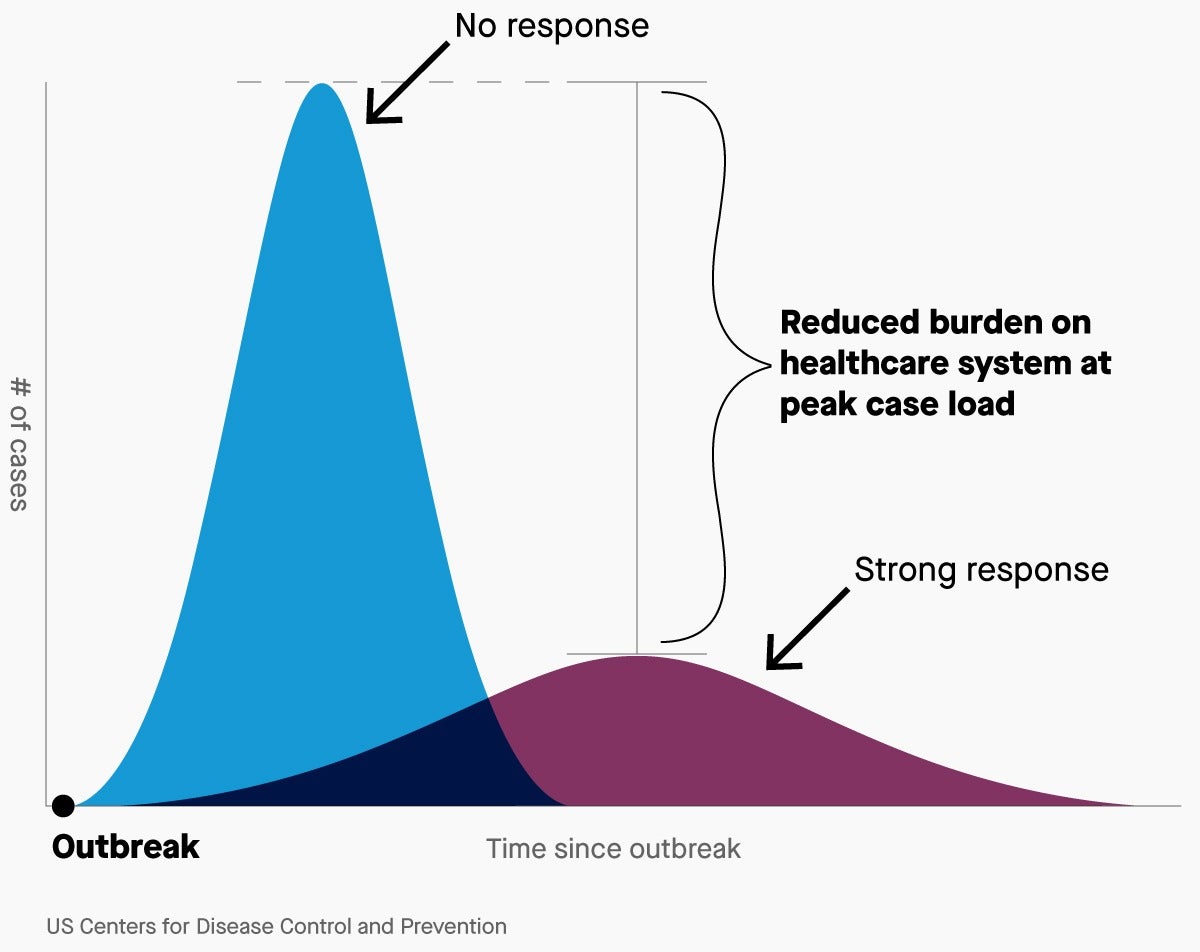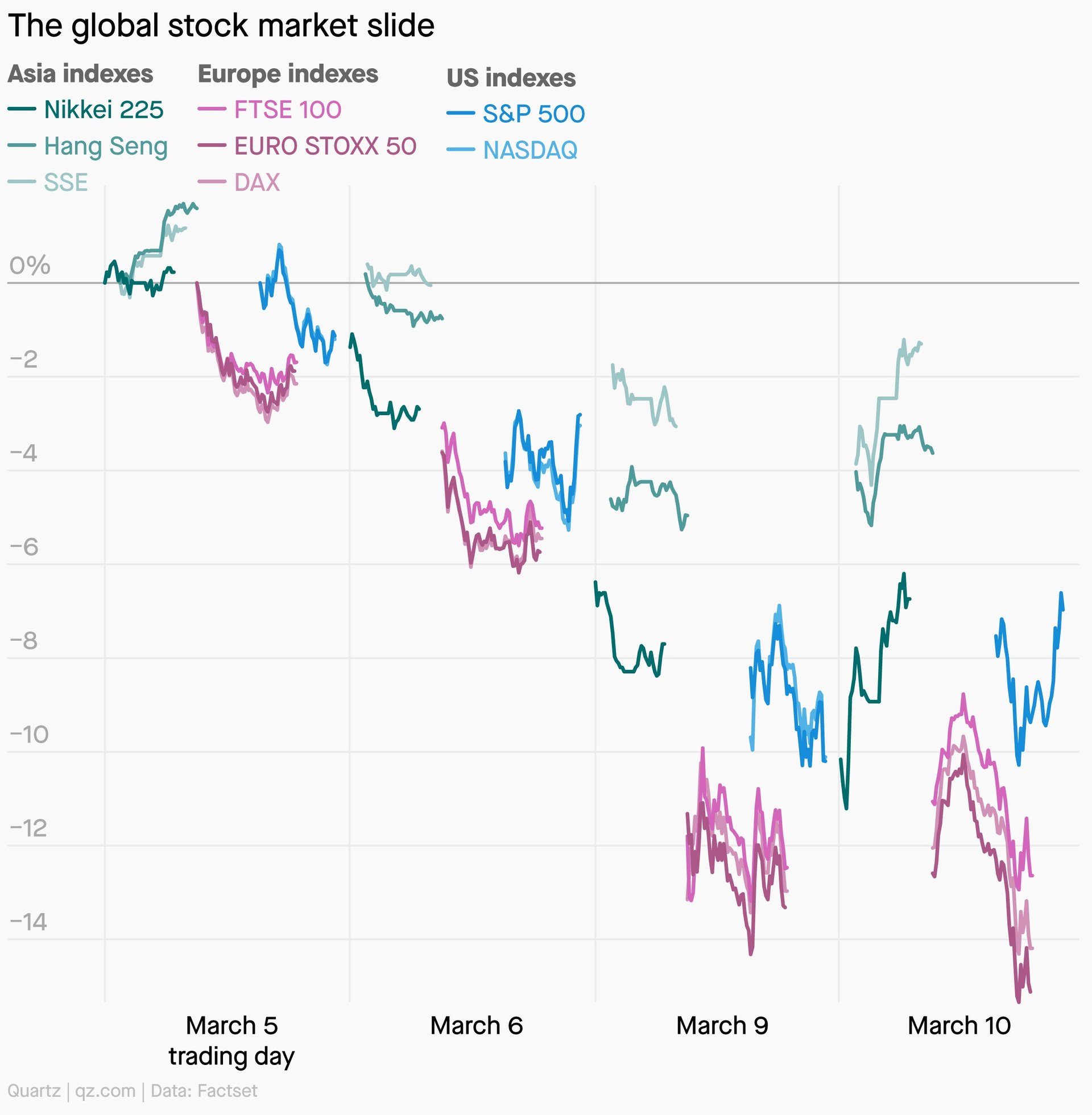Coronavirus: The US had one job
Hello Quartz readers,

Hello Quartz readers,
This week we’re watching Italy’s shutdown, virtual universities, and improving conditions in China. We also want to know what’s on your mind, so don’t hesitate to send questions, thoughts, or work-from-home selfies to [email protected]. Let’s get started.
China’s changing narrative
It’s been two months since the first known case of Covid-19 was discovered in Wuhan, China. To many Chinese onlookers, US leaders seem to have frittered away precious weeks that could have been used for preparation on political infighting instead.
On Weibo, the Chinese social media network, users have read posts under the hashtag “coronavirus conditions in the US” more than 500 million times. In comments, many express surprise that a country holding itself up as the world’s foremost democracy would struggle to manage an epidemic.
“This is exactly why there are few infection cases in the US,” wrote one user, responding to an article about an American man returning from Wuhan, who received a hefty medical bill after being placed in quarantine. “People there don’t even want to go have the test [because of the cost].” In China, testing and treatment for coronavirus is free and widely available.
The slow US response is also proving politically expedient for Chinese officials. Local newspapers have published opinion pieces criticizing the US for not doing enough to control the outbreak, including one in Shanghai’s Xinmin Evening News (link in Chinese) that said, “As the only superpower in the world, which is more developed than China, the US is supposed to have better medical and disease-prevention conditions.” The falling number of reported cases in China, worsening situations in South Korea and Italy, and the WHO’s praise of China’s seemingly draconian containment efforts, have only bolstered Beijing’s campaign.
The government has even begun to challenge the narrative that the virus originated in a seafood market in Wuhan. Last week, China’s ambassador to South Africa tweeted that “although the epidemic first broke out in China, it [does] not necessarily mean that the virus is originated from China.” And on social media, a new Chinese conspiracy theory is proliferating: that the US is in fact responsible for the coronavirus.
Flat and happy
While pandemics are almost impossible to fully contain, taking steps to slow the spread of Covid-19 remains crucial. Officials can mitigate the damage—to public health and the economy—if they can flatten the “curve” of infection.
In an unchecked pandemic, the number of infected people grows exponentially, as every sick person tends to pass it on to at least one more. (Covid-19 patients infect two to four people on average.) But by delaying and reducing the pandemic’s peak, officials can cut down on the number of infections and deaths, and keep health care services from being overwhelmed with a flood of patients. Here’s a handy visual:

Halt and catch fire
Listen, just stop looking at your portfolio. Log out, close the browser, and take some deep, healing breaths. *whispers* Because markets are all over the place.
A price war between Russia and Saudi Arabia sent oil markets crashing on Monday, and stocks fell so rapidly that the NYSE temporarily suspended trading for the first time since 1997. A Tuesday-morning recovery recouped almost half of those losses, but volatility continued—the Wall Street index that tracks market volatility is hitting levels not seen since 2008. Our in-office market emoji gauge currently reads a cryptic “💸.”

While this isn’t an exact replica of 2008, we’re not not thinking about a downturn. In January, Quartz asked the forecasters at Good Judgment Inc. to estimate the chance of a US recession this year, and got back an average estimate of 18%. When we posed the same question last week, the forecasters’ average estimate doubled, to 36%.
Remotely interesting
In our most recent email, we asked if your place of business had a coronavirus contingency plan: 35% of you said yes, 19% said no, and 46% said hand-washing and travel-avoiding just about sums it up. As confirmed cases climb in the US, we’re seeing an increasing number of companies (including ours) kick off contingency plans with an invitation to work from home.
Remote work isn’t available to everyone. But for those staring down weeks parked at the kitchen table, this guide to working from home, exclusive to Quartz members, is full of sage wisdom. Here are a few other tips from Quartz’s own distributed workforce.
- “Brush your teeth, wash your face, and put on your clean outfit of choice.”
- “Try to have your meetings in good light. It helps with credibility.”
- “Create multiple workstations for yourself to break up the day.”
- “Don’t eat too much. Your fridge and the snack cabinet is so close. Do not heed the call.”
A penne for your thoughts
Few things could distract Italians from panicking about an infectious epidemic. But one of them is a debate over pasta.
When Italy’s lockdown started in its northern Lombardy region last week, images of empty supermarket aisles made the rounds on social media. With one glaring exception: Boxes of penne lisce (smooth penne) were left behind as people instead bought penne rigate (striped penne), which are the same shape as penne lisce but have ridges on their surfaces that make them look striped.

The argument goes like this: Fans of penne rigate think they taste better because the ridges help the sauce stick to the pasta piece. Lovers of penne lisce prefer the consistency and flavor of their choice—and insist that a well-made sauce and a well-made pasta have no use for ridges. Each camp is strong in its position. Italian chef Gennaro Esposito, who runs a Michelin-starred restaurant near Napoli, even called penne rigate “the apex of weak thought.”
What’s your penne preference?
Essential reading
- The latest 🌏 figures: 118,099 confirmed cases; 64,391 classified as “recovered.”
- A quick study: New research sheds light on Covid-19’s symptoms and incubation period.
- By any other name: Health officials would prefer you not call it “Wuhan virus.”
- Lost pot of gold: Some $6 billion in St. Patrick’s Day spending is at risk.
- Keeping it for 💯: Princess Cruises is offering $100 vouchers to prevent cancellations.
- Watching your hands: This wristband buzzes when you’re about to touch your face.
- It’s catching: Many countries are using music to promote good hygiene.
Our best wishes for a healthy day. Get in touch with us at [email protected], and live your best Quartz life by downloading our app and becoming a member. Today’s newsletter was brought to you by Isabella Steger, Jane Li, Michael Coren, Katie Palmer, David Yanofsky, Patrick deHahn, Max Lockie, Walter Frick, Annalisa Merelli, and Kira Bindrim.